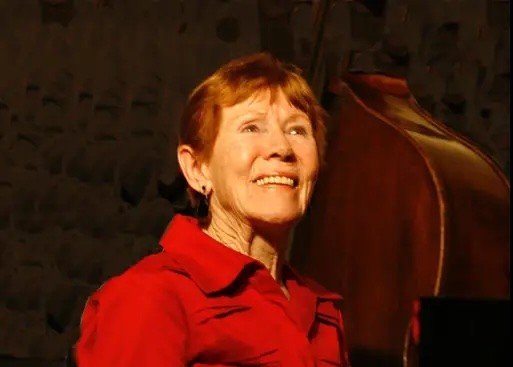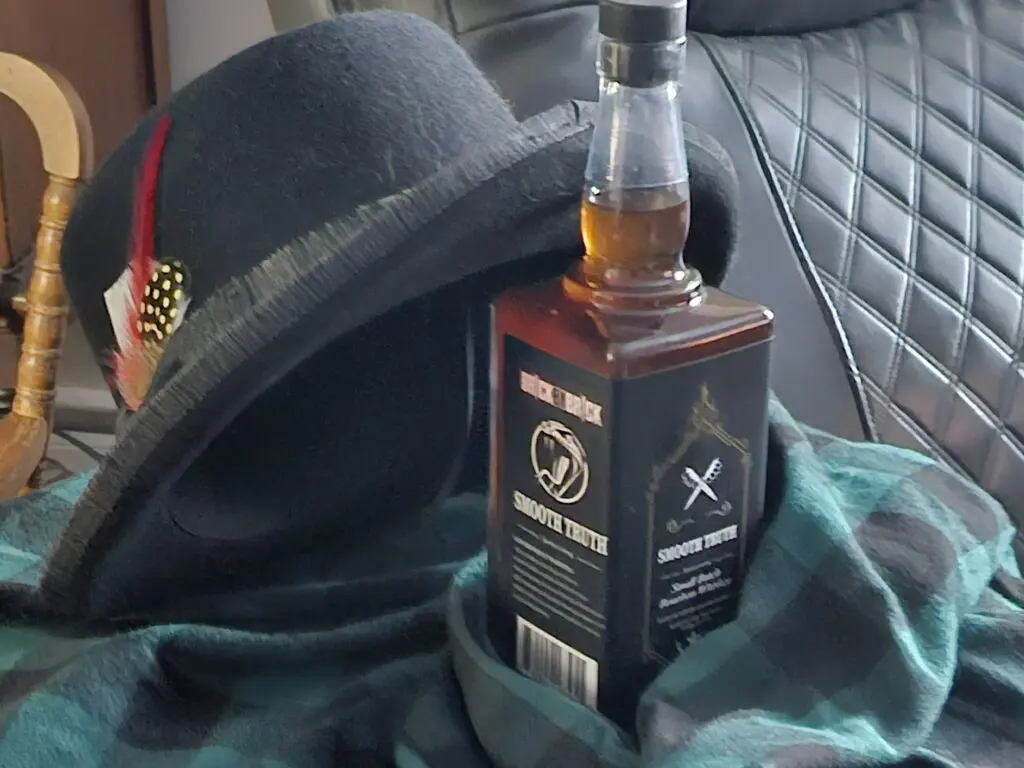Deb’s Saturday Psychedelia – On Becoming a Hippie (Chapter 46) – Playing in the Band
By Deb Cavanaugh on January 13, 2021
Now that Paul and I were reunited, we focused even more on our music. We had always written songs together, and I had missed that in addition to missing him. We both had gained a different perspective having had the time to think about our music as individuals for the first time since we had been together. We were each writing more songs than ever now, both together and alone, and were playing with a wide variety of people. We played in most of the local clubs, Bogies, 288 Lark, Pauly’s Hotel, Quintessence, QE2, Putting on the Ritz, and many others. We also still played at coffee houses and cafes as a duo. We played at all of the Rok Against Reganomix concerts, and some of the colleges, Union College, Hudson Valley Community College and RPI. We sometimes played live on WRPI and did the “Readings Against the End of the World” organized by Tom Nattell. We also played many of the local demonstrations and often wrote a song for that particular event. We were riding high. But we couldn’t seem to maintain keeping a band together. Although we had a core group, like many other bands, we went through bass players and drummers pretty frequently.
I had always wanted to have a keyboard player in the band. I studied classical piano for many years and could sight read quite well but wasn’t a jammer on piano. I now owned a Casio keyboard and was learning how to program it to have the sounds I wanted. However, my early piano lessons were very rigid. My teachers believed that there was only one way to play, and that was to play the notes on the page the way they were written. So, the one thing I never learned was how to improvise. Although I tried to teach myself this important skill, I never quite got the improvement I would have liked. I could teach my young students how to do it, but I couldn’t seem to let go of that classical training myself. We liked the keyboard addition but decided that we needed to find a real keyboard player.
One day, as I was working at the school, an interesting looking couple walked in.
I have always believed in putting what I need out to the universe. I recognize there’s a difference between what I want and what I need. I had been successful with this technique in the past, including having found a rehearsal space when we needed one. Having a keyboard player felt like a need, so I stood outside and asked for it out loud. A few days later, as I was working at The Free School in Albany, an interesting looking couple came in with two girls to visit the school. I took one look at the man, walked up and asked, “Are you a musician?” It turned out that he was. Then I asked if he played the keyboard. Again, the answer was yes. Now, once again, we had all of the pieces we needed to be a full band. I invited him to jam with us, and he soon became one of the core members of General Eclectic. We now had a rhythm guitar, lead guitar, keys, bass, drums, percussion and four of us could do vocals.
We soon found out that Bob not only played the keyboard but also played guitar, sang and wrote songs. He also knew the difference between playing and practicing. Before he joined us, I was always the one that kept us on track, insisting that we pay attention to detail, rehearsing certain sections until we got them right rather than just jamming endlessly. Because I had been a classical musician, I knew the value in real practice. I never have any trouble going over just one line or even one measure until it’s up to par. Paul was not interested in practice. To him, it was only about having fun. He felt that practice took the fun out of it. Andy also was looking for fun. I liked having fun, but I also saw that we were sloppy and was trying in vain to tighten us up. Now, I had a comrade who believed in the same thing. Bob and I took turns whipping the band into shape. This was great for me because I was no longer the only bad guy in the band.
Bob and I also tended to click in other ways musically. We had similar ideas about harmonies and arrangements. We also wrote a few songs together. I remember one night when he came up to the trailer and mentioned a piece of music he had been working on. As he played it, I grabbed a pen and paper and started writing. Almost instantly I had the melody and lyrics for “Slow Turn.” His music spoke to me and my contribution came pouring out. It’s always a rare gift when you find another musician who is on the same wavelength musically.
Unfortunately, there was now a growing tension in the band. Paul and Andy were getting more vocal but also being passive aggressive about the direction our rehearsals were going in. There was a growing tension between Bob and Paul and between Bob and Andy, our lead guitar player, and between me and Paul. In addition to Bob being a taskmaster, he also wanted to be playing guitar. He had joined the band as a keyboard player but loved the guitar more. I think Andy felt a little resentful. Paul and I thought there was room for both. They each had a different style of playing. Andy played like Jerry Garcia, which was great for some of what we did, but we played such a wide variety, sometimes the songs called for a different style. With Bob playing guitar in the band, we covered some Frank Zappa and Jimi Hendrix. We also started writing differently to accommodate this additional sound. It was encouraging us to grow which we both always saw as good thing. I think our biggest hurdle to getting gigs was that we couldn’t be pigeon-holed. It was impossible to fit us into a niche, hence the name “General Eclectic.”
We soon started hanging out with Bob, his partner Cindy, her two girls and their group of friends, thus expanding our circle even more. For us, our band was like a family. They had just moved to Albany and eventually moved into a large old mansion in the south end with another couple. Soon more of their friends relocated nearby. We made lots of new friends and thoroughly enjoyed ourselves. There were lots of parties where we played music all night long, often tripping and solidifying those musical and personal bonds. And there were more gigs as well. Life was good, but the tensions in the band never really went away, and Paul and I were back to fighting in earnest.
We got back together because I had given in. He never did agree to counseling and just went back to his old ways of ignoring the kids and blaming me for everything that went wrong. I think he resented staying in one place and really wanted to hit the road. He loved being a gypsy. I did too, but we had made a commitment to the kids that we would stay put for their sake. I didn’t regret it at all and thrived in upstate New York. I never imagined myself as a teacher, but now I had a career that I loved. I also loved being close to many major cities. There were so many opportunities here that hadn’t been available to us before. We were still working with the Rok Against Reganomix committee and a couple of us from that committee took over the People’s Pinxster Festival. This historical festival had been co-opted by the city and turned into the Tulip Festival. It had lost most of the historical significance, and we were tasked with trying to keep it as true to its origins as possible. We were also regulars now at the Half Moon Café. It felt like I was finally home. But Paul was working as a cook, jumping from one lousy job to another, never settling into a routine. He couldn’t seem to figure out where or what his destiny was supposed to be. He kept searching for that dream that leads us to believe that the grass is always greener on the other side.
We played almost every club in Albany, but The Half Moon Café was our home base. It was owned by a man who lived in Ithaca and ran another café there. He had given over the running of the Half Moon to a collective of people who were young and mostly in the punk scene. Unfortunately, none of them understood business and almost ran it into the ground. The rumor was that there were back taxes that hadn’t been paid in years, so Richard came back and threw them out. I had no idea what was going on, so I went in to introduce myself to him during his first week back. Although I can’t seem to hide the fact that I’m a hippie, no matter how I try to disguise myself, I must look pretty responsible because people often confide in me. The first time that I met Richard, he told me about all the troubles he was having with the folks who had been in charge. He told me that he’d also heard some pretty disturbing stories about some of the shows and other events held there. I admitted that some of the shows were pretty wild. “I heard rumors,” he said, “about a couple of acid tests that were held here.” I looked shocked and said in disbelief, “No!” I wasn’t about to tell him that we had organized those shows. Although I felt bad at the time, we had a huge following there now, and I didn’t want to lose that. It wasn’t unusual for us to have a full house plus a crowd out on the sidewalk and in the parking lot next door. Richard soon came to know and like Paul and our kids, and we continued gigging there.
Not long after that, we lost another bass player. We seemed to go through drummers and bass players like changing socks. They were always looking for a better gig. I couldn’t blame them, but it was frustrating. We had a band meeting and the guys decided that, instead of teaching someone new our songs, they would take turns playing the bass. The band bought an electric bass, and we had a whole new sound … again. It was a little odd because they all played the bass differently. Andy played it like a lead guitar, Paul played notes based on a chord, often playing partial chords. Bob played the closest to a real bass sound than each of them and was frustrated with their ignorance of the instrument. Now, we were back to having only one lead instrument again. I felt more comfortable playing percussion and doing my vocals, but sometimes we needed that solid background sound of the keys. So, I went back to playing rudimentary keyboard occasionally. I could always play chords and understood theory, but try as I might, I still couldn’t shake that rigid classical training.
My rocky relationship with Paul was starting to affect the band now. We often bickered at practice, creating a cloud of tension in the air. Richard noticed it at a Half Moon gig one night and offered us free tickets to a Dutch Apple Cruise he had organized for the café. He wanted us to have a romantic evening. That night, we fought all the way into town and upon arriving on the boat, we each went our separate ways. So much for our romantic evening. I stood by the rail watching the river flow past as Paul went to the bar. Pretty soon, he came walking over with a tall man in tow. “Hey Deb,” he said chuckling, “I want you to meet my long-lost brother Dick Kavanaugh.” They had met in the bar, and Paul was intrigued with the similarities in their names. We chatted a bit, then Paul went back to the bar, leaving me and Dick to enjoy the rest of the trip together. I remarked that this was the second time he was pointed out to me. My first friend in the area, Linda, had told me that I should meet Dick Kavanaugh because she thought we would really get along. And we did. We spent that time getting to know each other, and the time flew by. At the end of that cruise, we parted ways, and I didn’t see him again for years. Many years later, Dick confessed to me that he moved out of town after that because he’d always had a crush on me, sitting in the back of the café during our shows, never daring to speak to me because he knew I was married. We had even talked about my marriage on that cruise. I’d admitted that I was unhappy but was committed to trying to make it work. Now that Paul had thrown us together, and he’d actually spent time with me and knew how miserable I was, he couldn’t stand to be around the two of us together, so he chased after a different woman and moved to Massachusetts.
We played at The Half Moon Café at least once a month and attracted as eclectic a crowd as the music we played. They came from all walks of life and were all ages. One teenager loved to sketch while listening to our shows. We always played for tips at the café, so he made us a sign on the back of a Motley Crüe album cover, for our tip jar. I’ve since lost the bottom that read “Donations Requested.” We always thought that we would use it for an album cover, but that album never got made during Paul’s lifetime. Another night, during one of our breaks, a woman came up and introduced herself. She was Caroline Johnston, who later became known as “Mother Judge.” She was a musician and songwriter who had just relocated, being originally from the Pittsburgh, Pennsylvania area. She was also a single mom with two children. Her son Bruce was my son’s age, and they eventually met at The Museum Club, an afterschool program held at the New York State Museum. Justin and Bruce became fast friends and got in plenty of trouble together. Caroline’s daughter was younger than Jessie, and unfortunately, they didn’t hit it off. She later told me that she had just arrived in town when she showed up our gig, and we were among the first three people she met here. We met lots of other great musicians at The Half Moon, too. Some of them also became regulars and became our friends.





 RadioRadioX
RadioRadioX